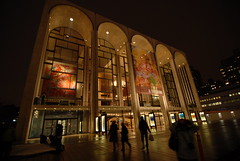Hello world! It is official, I just received my masters degree in music performance from the University of Michigan; School of Music Theatre, and Dance!!! I’m displaying my diploma on my desk as I type. Most people don’t really understand what types of things a person learns when they specialize the voice as an instrument. Some assume that you were born with the talent and didn’t need to do a whole lot cultivate your “gift.” So I would like to correct some of that confusion in this post and let you know what things you really learn in music school as a singer.
For the basics, most music majors learn advanced music theory (the mathematics of music), sight-singing (being given a sheet of music and without help being able to sing what is written), music history (from the beginning to the present), composition (writing music in the style of the classical composers), music technology (recording/computers etc), conducting (choir/symphony/band), score interpretation (which changes based on language, time period, and composer), and basic piano skills. Vocal majors take diction courses in at least three foreign languages. In these courses we learn how to sing the language with clarity, correct pronunciation, no foreign accent, basic grammar, and translation skills. It is of the up-most importance that a singer be able to communicate clearly in whatever language they are singing in and understand every word they are saying. You also work largely with the international phonetic alphabet, it’s sounds, and writing out the text of each song in this alphabet. I have learned to sing in German, French, Italian, some Chinese, Japanese, and proper English. I plan to learn Czech and Russian soon. You also learn various languages. I have experience speaking Italian, French, and German through formal language classes. There are many classes focused on acting and polishing your repertoire. A vocal major will also learn how to teach voice lessons to others. I am currently able to do so.
Then there is the music aspect of things. There are so many different styles of vocal music to choose from. For the classical vocalist, they will learn French chasson, German lieder, English art song, Italian art song, oratorio (sacred classical music), opera, cabaret, modern works (this does not mean pop but music being written by modern composers), and musical theatre. Classes are offered in all of these areas which must be completed by graduation. Usually a voice major will be performing in operas put on by the school they attend.
Last, there are the voice lessons and working with a collaborative pianist. Working with a voice teacher who can teach you well is the most important thing to consider when deciding which music school to attend. In voice lessons one works on vocal faults, strengthening the voice, gaining range, flexibility, consistent tone quality, musicality (what is in the score), breath management, and many other things. Often times this work can be likened to that of an athlete learning to be flexible and train their body. Some may think that being an instrumentalist is harder because they have to actually hold their instrument and learn how to produce each tone by moving their hands/fingers. Singer just have to think about what they want to sing and then viola! This is not correct. The vocalist has a completely different set of issues to work through (and this work takes years!); you can’t see, hold, or easily physically manipulate your instrument. The vocal chords and surrounding muscles often work involuntarily meaning you can not tell your muscles to move in the same way you can tell your arm to raise or your hand to pick up an object. So vocal training involves intense concentration, feedback from others (especially a coach), training your mind, trial and error, and using mental imagery to help the vocal mechanism relax/create balanced tone. The goal is to eventually no longer need to think about your vocal technique when you go to sing a song, but to focus on the quality of text, and performance at hand. Working with a collaborative pianist means learning music together, interpreting it, and making it a unique performance of artistic significance (not just playing/singing together in time). Most people do not realize that the pianist accompanying a singer is just as much a part of making a meaningful performance as the main stage singer.
A day in the life of a vocal artist in training may look something like this:
~Get up, go to classes: German/French/Italian diction, art song class, oratorio class, conducting class, opera workshop, acting class, music history or music theory etc. (say 8am-3pm)
~Go practice two-four hours (both singing and score study) including technique and assigned performance pieces. Score study includes working on the language of that particular song, which words would be emphasized, what would the composer ask for (dynamics, tempo, key changes, etc), pronunciation, memorization of text, why the song was written, what is the formal structure of the piece, and speaking the text like a native. Musical study includes learning notes/rhythms, singing with consistent tone through entire piece, marking in where to take a breath..there are unacceptable places to do this, actually implementing what the composer has marked, creating a unique interpretation, creating a performance, working on acting, facial expressions, and creating a character.
~Attend voice lesson or coaching with pianist.
~In the evening go to opera rehearsal for another 3-4 hours. This involves being a part of a show.
~Do written homework assignments (including conducting/music theory/composition etc) (for 3 hours).
Having lived through such a crazy full schedule myself it is a challenge to get through but very worth it. I am so glad and proud to have finished strong. There is still so much to learn and I look forward to continuing to hone my craft as a vocal artist. Some of the greatest things about being a musician is that your work is always able to get better, you can always learn more, improve, and you get to learn/be in contact with your humanity (and that of other’s) every day…after all music is an expression of the soul and deep emotion! Will I go for a doctorate? Not anytime soon, its time to get out there and start performing!


